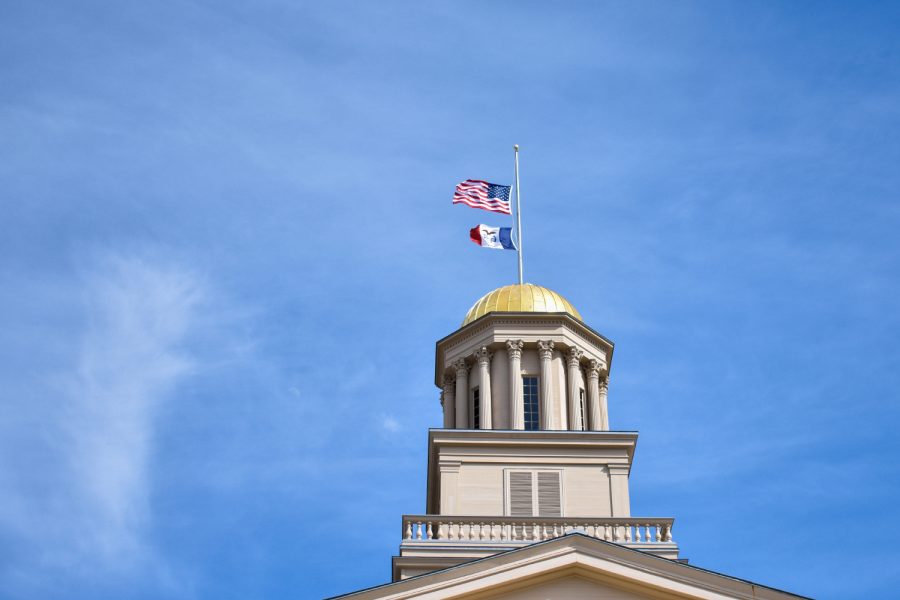Opinion | Tuition increases aren’t the answer
Tuition hikes won’t solve long term financial issues for Iowa’s universities.
The Old Capitol is seen on Sunday, March 21, 2021.
June 30, 2021
Among the anticipation for Big 10 sporting events and live performances at Hancher Auditorium also comes the unfortunate tuition hike for Hawkeye students.
The state Board of Regents proposed a $283 tuition increase for undergraduate students and a $353 increase for graduate students, but a final decision won’t be made for the 2021-2022 academic year until July 28.
Tuition hikes aren’t anything new for Iowa’s universities. While the regents implemented a year-long tuition freeze in June 2020, the proposed increases reflect a multi-year tuition model that the board introduced in 2018. The model outlines an increase in tuition fees by 3 to 5 percent each year over the course of five years.
Although Regents President Mike Richards said the board is trying to keep the cost as low as possible, the roots of the problem stem from more than just the return to the model.
First, affordable tuition for Iowa’s universities has always been an issue. Last year, the cost of attending the UI came at a steep price for undergraduates with a rate of $9,605.50 for in-state and $31,568.50 for out-of-state students. Because of the high price tag, attending Iowa’s universities can be seen as a privilege — or even a luxury for some.
With over $185 million financial losses due to COVID-19, it’s not a shock that the board is making a return to this model. But on a larger scale, the regent universities experienced a four-year decline in enrollment starting in 2016, with the UI also experiencing a 45 percent drop in international student enrollment in the last five years.
Additionally, the state government cut funding to the board by $8 million last year and refused to increase funding for the 2021-2022 academic year.
The combination of COVID-19 financial losses, a decline in student enrollment, and a lack of state funding creates the perfect recipe for a financial crisis at Iowa’s universities. But increasing tuition is not going to solve the problem. Instead, we need to figure out why we have to raise the price in the first place.
If there’s a decline in enrollment, it’s time to look into changing recruitment efforts. If we are losing funding from the state government (that obviously doesn’t value higher education institutions), then maybe investing in public-private partnerships is the way to go.
Further, alarm bells should be ringing for the board as recent data shows that college enrollment across the country decreased dramatically by 5 percent in the spring. With fewer students finding it affordable to pursue a degree because of the COVID-19 pandemic, we can expect low enrollment at Iowa’ won’t be going away anytime soon. But a continuous decrease in enrollment numbers also gives reasoning for the state to continue to place less value on Iowa’s institutions.
The bottom line is what needs to happen is changes in the system, and Iowa’s universities must take it into their own hands to make that happen. For the board, the obvious and easiest short-term solution is implementing tuition increase. But in reality, it’s putting a band-aid on an old wound that won’t solve long term problems and cause harm in the future.
Increasing rates drive away prospective students by putting Iowa universities on a higher pedestal where the cost acts as a barrier to attend. Relying on current students and families also isn’t a viable or even fair option. The burden of making up for financial losses cannot fall on the backs of students who are expected to build the future of America.
Making higher education in Iowa affordable won’t happen overnight, but it’s time to start taking the right steps to begin the process. Addressing the roots of tuition hikes and coming up with long term solutions instead of relying on students to finance the universities is what’s going to save the future of Iowa’s higher education institutions.
Columns reflect the opinions of the authors and are not necessarily those of the Editorial Board, The Daily Iowan, or other organizations in which the author may be involved.



